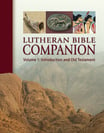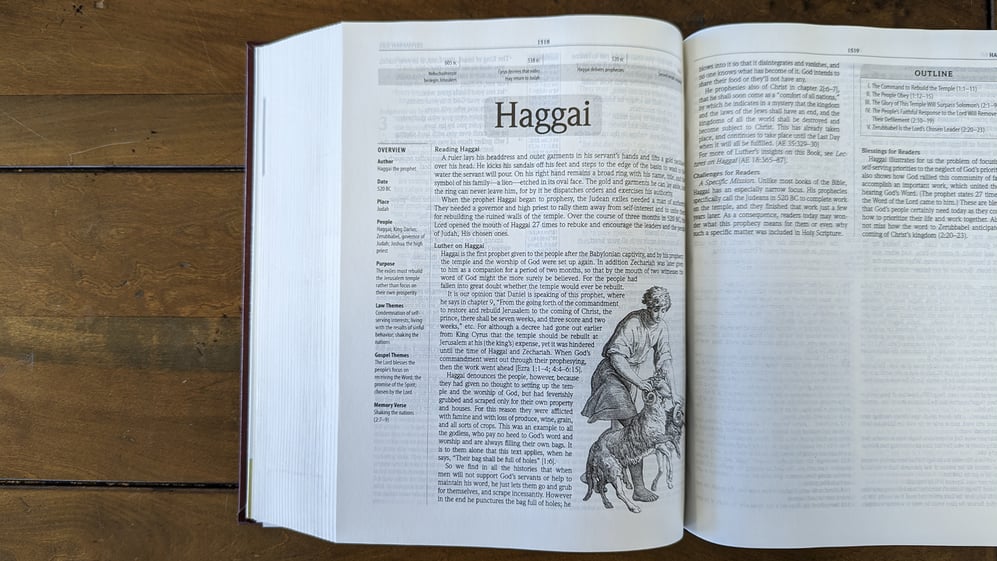Is it safe to build the temple again? Are we going to be destroyed by another nation? The people of Judah were asking these questions during Haggai's time, and God used Haggai to reveal His will to the people. The following has been adapted from the Lutheran Bible Companion.
Date of Composition
One striking contrast between Haggai and the preexilic prophets is the precise dating of Haggai’s oracles. Perhaps this practice of dating is partially anticipated in Ezekiel, but its only real parallel is in the nearly contemporaneous oracles of the first half of Zechariah. Modern scholars would be thrilled to have such precise information about earlier prophecies, but as we have noted many times, the Bible’s ultimate interest is not with time, but with God’s Time, “in, with, and under” our time.
As the text of Haggai stands, we have four precisely dated oracles, all in
the second year of Darius (520 BC), and covering a period of not quite four
months: (1) on the first day of the sixth month (1:1); (2) on the twenty-first
day of the seventh month (2:1); and (3 & 4) two oracles on the twenty-fourth day of the ninth month (2:10, 20).
Purpose
Haggai’s book is very short, containing only 38 verses. The objective of Haggai’s messages was primarily practical: to urge the Judeans to resume and complete the rebuilding of the temple in Jerusalem that had been interrupted earlier (c 530 BC) by the opposition of the people who were occupying the land when the Judeans returned from exile.
Characters
Haggai wrote his oracles to the Judeans who had resettled Jerusalem and Judea. The intimidated settlers, who feared retaliation from the neighbors and from Persian authorities, abandoned their plans to restore the temple. Haggai is recorded as addressing the people directly or primarily only once (1:13), when he assured them that Yahweh was with them in their resolve to proceed with the construction. His references to the “remnant” (1:14; 2:2) betrayed the nagging question in the background about whether or not they really were the true Israel, the heirs of the promise. The first two oracles were addressed to the two leaders who figure prominently also in the Book of Zechariah: the governor Zerubbabel and the high priest Joshua, who were aroused to action and successfully led the people to complete the temple in 516 BC.
The fourth and final oracle (2:20–23), delivered on the same day as the preceding one, is addressed to Zerubbabel alone. Picking up the theme of shaking the kingdoms of this world again, Haggai heaped up messianic language and applied it to Zerubbabel, grandson of King Jehoiachin. He called Zerubbabel “servant,” “chosen” or elect one, and “signet ring” (used to represent the owner in sealing letters and documents). This promise is very similar to some in Zec 3, 6. It is the major point of the Book of Haggai and the postexilic period.
Specific Law Themes
Haggai rebuked the Judeans for their timid and self-serving response to the
challenge of rebuilding the temple—they did nothing. He explained that the
reason they failed to prosper and receive God’s blessings was that they were living with the results of their sinful behavior (1:9–11). When the congregation did step forward and build the temple, the size and simplicity of the building reminded them again of all that they had lost (2:3). Haggai concluded his prophecies with a message for all nations, that the Lord would shake the empires and exercise judgment over them.
Specific Gospel Themes
Haggai provides an unstated promise of God’s blessing along with his encouragement to rebuild the temple (1:6–11). He highlights the trust (“the people feared the Lord;” 1:12) that follows as the people returned to their work. The promises of blessing become explicit in ch 2. The Lord will not only bless the people, but they will have His Spirit continuously (2:5). They shall live as God’s chosen people, and their governor, descendant of King David, is the object of special promises that are finally fulfilled in his descendant, Jesus of Nazareth.
Text adapted from the Lutheran Bible Companion, Volume 1: Introduction and Old Testament (pp. 972-977) © 2018 CPH. All rights reserved.
 Read more about Haggai in the Lutheran Bible Companion.
Read more about Haggai in the Lutheran Bible Companion.













